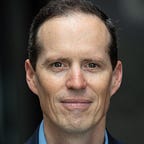Become who you are
Every human being faces a fundamental choice of how to live, whether ultimately for oneself or for others. The choice to live for others — to love — is already a participation in the life of God. In the language of the ancient hymn, ubi caritas et amor deus ibi est, where there is self-giving and love, God is there. We share in God’s life when we respond to love’s call.
Perhaps the best-known image of this invitation to love is the icon of the Holy Trinity written by Andrei Rublev in early fifteenth-century Russia. His depiction of the three angels that Abraham hosted not only calls to mind the Christian doctrine of God-in-three-persons — Father, Son, and Holy Spirit — but also signifies a call to enter into koinonia (communion) with God and so share in the life of self-giving love that is the reality of the divine life. The icon tilts, as it were, toward the viewer, with an open-ended table pointing out from the three angels, inviting the viewer to sit at the table.
The angel at the left represents the Father, with the other two looking toward him; the Father gazes toward the Son on the right and raises his hand in a gesture of peace. He sees the Son. The icon is an invitation to “act in God’s eye.” After all, in God’s eye we are the image of Christ, the Word of God enfleshed.
We are invited into the koinonia of the Trinity as we are, in order that through the Holy Spirit we might manifest God’s Word in the world. By doing so, we answer the Father’s invitation to each creature to become itself — to selve — by entering into the life of the Trinity. “He has given us . . . his precious and very great promises, so that through them you may . . . become participants of the divine nature,” wrote the author of the second letter of Peter (1:4). What this means is that God’s invitation is to be what God has created us to be, and thereby to gain a piece of heaven. I must be myself; you must be yourself, and no other.
excerpt from Living Against the Grain
